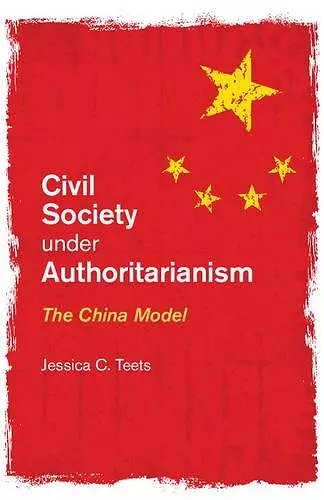Civil Society under Authoritarianism
The China Model
Format:Hardback
Publisher:Cambridge University Press
Published:9th Jun '14
Currently unavailable, and unfortunately no date known when it will be back
This hardback is available in another edition too:
- Paperback£30.99(9781316507919)

Civil Society under Authoritarianism takes a fresh look at civil society in China, analyzing the nuanced and dynamic relationship between civil society and government officials.
Much of what is written about civil society in China focuses on state repression. However, this victim-centered narrative disregards how such organizations are able to teach state officials about the benefits of a vibrant civil society. This text demonstrates the power of learning and the agency of civil society to change local officials' perspectives.Despite the dominant narrative of the repression of civil society in China, Civil Society under Authoritarianism: The China Model argues that interactions between local officials and civil society facilitate a learning process, whereby each actor learns about the intentions and work processes of the other. Over the past two decades, often facilitated by foreign donors and problems within the general social framework, these interactions generated a process in which officials learned the benefits and disadvantages of civil society. Civil society supports local officials' efforts to provide social services and improve public policies, yet it also engages in protest and other activities that challenge social stability and development. This duality motivates local officials in China to construct a 'social management' system - known as consultative authoritarianism - to encourage the beneficial aspects and discourage the dangerous ones.
'China has become the mega enigma of the global economy. Using a new model of 'consultative authoritarianism', Jessica Teets shows us how Chinese rulers and civil society organizations mutually learn from one another through their interactions, so that domestic institutions become more adaptive and less fragile over time. Teets has given us a new and powerful explanation for the durability of authoritarianism in general, and the dynamism of China in particular, that suggests those holding their breath for Western-style democracy to inevitably emerge in China may remain blue in the face for a long time to come.' Mark Blyth, Brown University
'Professor Jessica Teets has written an important book, with significant theoretical and policy implications. Using case studies undertaken in China and drawing on global comparative literature, Teets argues that there may be a more effective path to achieving good governance than the civil society–regime adversary model adopted by many in the West. Dr Teets calls it 'consultative authoritarianism', a process in which an authoritarian regime and civil society organizations mutually influence one another through a process of learning. Although this thesis is sure to be controversial to some, many adversarial-democracy promotion efforts around the world have reached, to date, illiberal dead ends. Teets begins the new thinking that is required if we are to find a better way to positive, gradual, and constructive change.' David M. Lampton, Hyman Professor and Director of China Studies, Johns Hopkins School of Advanced International Studies
ISBN: 9781107038752
Dimensions: 222mm x 143mm x 18mm
Weight: 410g
252 pages